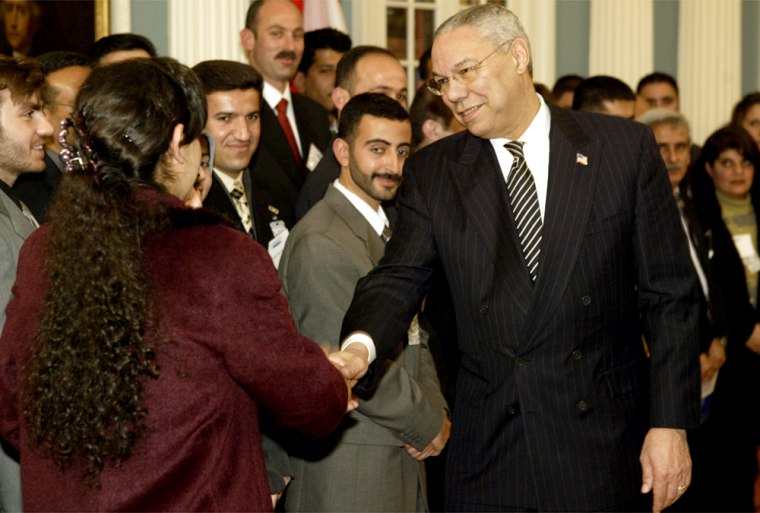After a 14-year-long suspension, academic ties between the United States and Iraq are being renewed this week, with the arrival of 25 Iraqi Fulbright Scholars in this country.
The group of students and researchers will spend the next two to three years on American campuses, gaining the knowledge and cultural insights they say they’ll need to rebuild their country.
President Bush will welcome the group of scholars Tuesday in the Roosevelt Room of the White House.
Although the U.S.-Iraq Fulbright relationship dates back to 1951, only about 200 Iraqis and 100 Americans took part in the educational exchange program until 1990, when it was suspended during the run-up to the Gulf War.
Great interest
Assistant Secretary of State Patricia Harrison told reporters during a briefing on Friday that she was stunned by the level of interest in the program this year.
“So many people applied, and those people who didn’t qualify to take the test were still aware of the program. And all this augers very well for what we want to do for the academic exchanges in Iraq.”
The Fulbright Program, named for the late Sen. William Fulbright, D-Ark., is the flagship international educational program of the U.S. government. It sends American scholars, graduate students, and professionals abroad for study and brings foreigners to the United States to pursue their studies in this country.
According to the State Department’s Bureau of Educational and Cultural Affairs, just 379 Iraqi students, out of an estimated 350,000 students nationwide, applied for the program in October 2003.
There was interest from another 300 applications, but they were disqualified because applications were incomplete or the applicants couldn’t satisfy the basic English requirement. Two months later, after being screened by two U.S.- Iraqi panels, 25 winners were selected.
“The priority areas were related to rule of law,” said Tom Farrell, Deputy Assistant Secretary for Academic Programs at the Bureau of Educational and Cultural Affairs, who joined Harrison at the Jan. 23 briefing.
The 19 men and 6 women, who are mostly in their 20s -- but two of whom are in their 50s -- will start their American year with an orientation period in Washington, D.C., followed by what’s called a “pre-academic” session at one of four campuses: University of Arizona, Indiana University, University of California at Santa Cruz, and the University of Oregon.
This summer and fall, the scholars will enroll at various campuses nationwide to complete one- and two-year master’s degree programs. The total cost of re-establishing the Iraq Fulbright Program this year will be $1.2 million. Plans to send American Fulbrights to Iraq are in the works, but no date’s been set for that program to start.
No price for opportunity
Several of this year’s scholars said there’s no price that can be placed on the opportunity they are getting.
“I saw people dying for simple reasons [and] decided to study infections to lessen their impact on society," said public health doctor Shaheen Jihad who is counting on his time in the United States to improve his clinical skills.
Linguistics professor Abbas Jawdat Raheeb wants to find a solution to language instruction, but not for Iraqis. His goal is “to work out some pedagogical recommendations that would, if taken into account, help Americans speak Arabic with reasonable pronunciation.”
Lawyer Istabrak Saib Ahmed said even with three degrees to her name, she is looking for American know-how in rebuilding her society. “Laws are still good in Iraq, but the system of justice is broken.”
Secretary of State Colin Powell met with the group scholars and received a warm reception from them at the State Department on Monday.
Powell paid tribute to the group’s talents and potential, and called on them to promote intellectual freedom in their homeland. The secretary then set the bar high for the Iraqis’ performance -- some former Fulbrighters now lead their countries. He joked with the group, “Don’t everyone want to be president at once! Take turns.”
The scholars’ response was to rush up to Powell after his remarks, each clamoring for a Polaroid moment to share with their families and friends- their jostling and joy captured by a bank of television and newspaper photographers for all the world to see.
